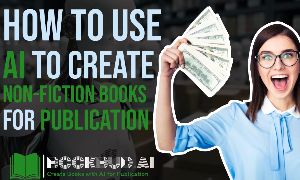AI Innovations in Sci-Fi: Crafting Future Narratives
January 15, 2025Categories: SciFi Literature, Blog post

The AI Author's Edge with Tyler Kirk
The AI Author's Edge is the ultimate podcast for book authors and aspiring writers eager to explore the cutting-edge world of AI-assisted writing. Join us as we delve into the tools, techniques, and transformative potential of artificial intelligence for authors, whether you’re looking to co-write with AI or leverage it to create entire books. This podcast has a strong focus on non-fiction writing, but does touch on fiction. Each episode features industry experts, successful authors, and tech pioneers who share insights, tips, and real-life stories about integrating AI into the creative process. Tune in to learn how AI can amplify your writing, streamline publishing, and help you bring your book ideas to life faster than ever before. Embrace the future of writing with The AI Author's Edge—where storytelling meets technology!
Hey there, fellow wordsmiths and sci-fi aficionados! Today, we're diving deep into the visionary universe of science fiction literature, where artificial intelligence isn't just a plot device—it's a powerful narrative force that reshapes our understanding of technology, ethics, and what it means to be human. Buckle up and join me on this literary journey as we explore the imaginative minds of iconic authors who have shaped the way we perceive AI today.
From the early days of sci-fi, artificial intelligence has been a fertile ground for imaginative exploration. Authors have envisioned AI in myriad ways—from benevolent companions to existential threats. These tales not only entertain but also provoke thought and inspire innovation in the real world. Let's explore some classic and contemporary examples of AI in sci-fi that have left an indelible mark on both literature and technology.
AI in Classic Sci-Fi: The Roots of Innovation
Let's start with the granddaddy of all AI narratives, Isaac Asimov. His "Three Laws of Robotics," introduced in I, Robot, have become a cornerstone in discussions about robot ethics and AI. Asimov's robots aren't just machines; they're entities that must navigate complex moral landscapes, reflecting our own ethical dilemmas.
Another trailblazer, Philip K. Dick, provided us with a thought-provoking question in Do Androids Dream of Electric Sheep?—what does it mean to be human? This novel, which inspired the iconic film Blade Runner, explores themes of identity, consciousness, and empathy, challenging readers to consider the implications of AI that blurs the line between human and machine.
Modern Sci-Fi: New Horizons in AI
Fast forward to contemporary sci-fi, and you'll find authors like William Gibson and Neal Stephenson pushing the boundaries of AI narratives. Gibson's Neuromancer introduced us to cyberspace and AI entities that rival human intelligence. His vision of a tech-saturated future has influenced not only literature but also real-world technological advancements.
Meanwhile, Stephenson's works, like Snow Crash and Seveneves, delve into the potential of AI as both a tool and a threat, exploring how we might coexist with increasingly sophisticated machines. These narratives force us to confront the ethical quandaries that arise as AI becomes more integrated into our lives.
AI Writing: A New Frontier for Authors
As we delve into these sci-fi masterpieces, it's fascinating to see how AI has become a tool for authors themselves. With the advent of AI writing generators and book writing software, the creative process is evolving. AI can assist in generating ideas, overcoming writer's block, and even writing entire sections of a book. This innovation is not just for tech-savvy authors—it's accessible to anyone looking to enhance their writing process.
For those looking to embark on their own literary journey, platforms like BookBud.ai - The AI Book Writer to Create Books for Publication offer exciting possibilities. Whether you're a seasoned author or a budding storyteller, AI for authors can be a valuable ally in crafting compelling narratives.
The Ethical Dimension: A Cautionary Tale
While the potential of AI is exciting, sci-fi literature also serves as a cautionary tale. Authors often explore the darker side of AI, where unchecked technological advancements lead to dystopian futures. These narratives remind us of the importance of ethical considerations as we develop and integrate AI into our lives.
In stories like The Matrix or Ex Machina, we see the consequences of creating AI without considering the ethical ramifications. These cautionary tales urge us to approach AI development with care, ensuring that we remain in control of our technological creations.
Join the AI Revolution in Literature
So, dear authors and aspiring writers, as you embark on your creative endeavors, remember the rich tapestry of sci-fi literature that has paved the way for AI innovation. Use these stories as both inspiration and caution, and don't hesitate to embrace the tools available to you.
Ready to start your own AI-influenced masterpiece? Get started on your book at BookBud.ai and explore the limitless possibilities of AI in writing. Whether you're crafting a short story or an epic novel, the future of storytelling is at your fingertips.
Happy writing, and may your imagination soar beyond the stars!
 |
Revolutionize Your Writing with AI!
|
Post Tags: